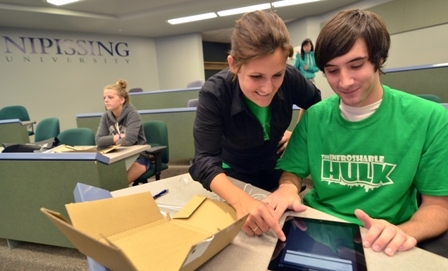Nipissing launches iLearn

Back to school shopping for first-year students in Nipissing University’s School of Business just got a whole lot simpler. On Thursday, they each received a complimentary iPad, thanks to the iLearn project.
The iLearn project is a direct response to the growing use of mobile devices that can support and enhance learning in class. iLearn also provides an opportunity to prepare students for future careers where technology expertise will be essential.
While all first-year business students are receiving an iPad, Nipissing is also piloting their use in the Criminal Justice and Nursing programs as well.
“We are proud to be taking a leadership role in the use of mobile technology in post-secondary education,” said Dr. Rick Vanderlee, dean of the faculty of applied and professional studies. “Anticipating and meeting the changing needs of our students is fundamental to Nipissing’s mission as a student centred university. The iLearn project should provide some sense of how we can best integrate available technology into a traditional classroom setting to the benefit of students and faculty.”
Using iPads opens up a range of new opportunities, including reading electronic textbooks, taking electronic lecture notes, and completing tests electronically, which reduces the cost of books and supplies for students and significantly reduces paper usage, helping the environment. In addition, the School of Business has been working with Nipissing’s Centre for Flexible Teaching and Learning, and University Technology Services to identify teaching strategies and applications (apps) that will yield measurable benefits for students and instructors. One useful app that was identified is Evernote, which allows students to create notebooks from a variety of online sources including text, photos, videos and audio recordings. The DocAs app, which allows for more advanced note taking, like PDF annotation and audio, as well as wireless printing is another promising app for the iLearn project.
“I was really excited to get my iPad and start working with it,” said first-year Business and Technology Management student Anthony Celebre. “With the iPad, I’ll be able to stay organized, download textbooks and create projects for class. It’s a great tool for me because I like being hands-on and creative and the iPad allows for a lot of creativity and control. Plus, I love technology.”
Exactly how the iPads will be employed in class is under the discretion of individual professors. Nipissing School of Business professor, Colin Mang, has used iPads in his classroom previously as part of a pilot project last summer.
“The iPads help to enhance communication and interaction among the students, leading to greater collaborative efforts and higher quality group work. The students' ability to perform on-the-spot research also enhances the quality of class discussions,” said Mang. “The iPads have already been shown to be less distracting for students than using laptop computers in the classroom, and the iPads help the students to stay focused on their lecture material.”
The iLearn project also includes a research study. Given the newness of mobile technology in post-secondary education and the need to understand its strengths, weaknesses, and opportunities, the study will examine the experience as a whole in addition to outcomes from both a student and faculty perspective. The perspectives of the technological and educational support team will also be documented.
Students' experiences will be captured through surveys and focus groups. Students will be specifically asked about usage of the devices for learning. Final grades will be compared with the same performance measures in previous years of the same courses. Instructors will be surveyed about their integration of the iPad, their comfort levels with the device and their opinions about class engagement and performance. Technological and educational support team members will be consulted about their experiences supporting iPads in this environment. Taken together, these three sources of data will enable Nipissing to create a rounded picture of how mobile technologies can be used in the classroom, the benefits of mobile technology to students and teachers, and infrastructure and organizational requirements.
